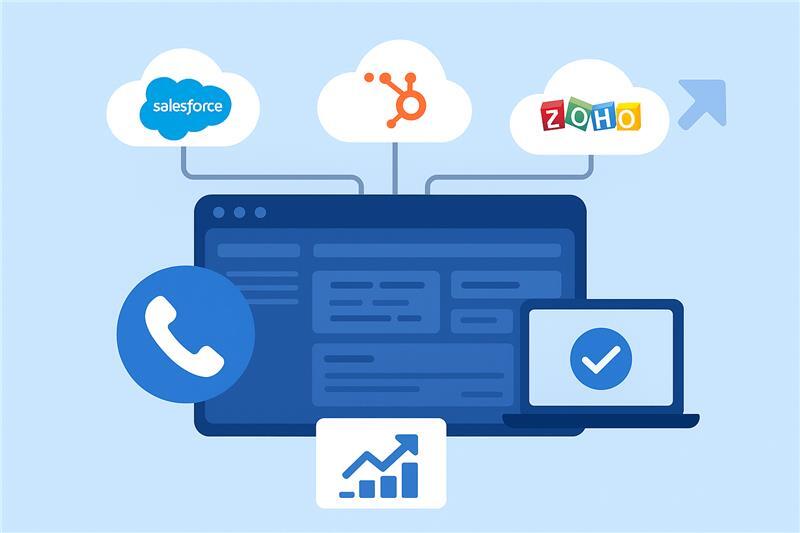
Conversation Intelligence: Unlocking Deep Sales Insights with AI
Struggling to meet sales targets and truly understand your customers? In today's competitive landscape, the stakes are higher than ever. How can you stay ahead and close deals faster? The answer is conversation intelligence. By analyzing conversations, Conversation Intelligence can help you:
- Refine your sales strategies
- Improve sales team performance
- Boost revenue
Can you afford to miss out on this game-changing innovation? Keep reading to discover how conversation intelligence is revolutionizing sales.
What is Conversation Intelligence?
Conversational intelligence refers to the use of artificial intelligence (AI) and natural language processing (NLP) technologies to analyze and understand human conversations.
Consider this: Every day, US call centers spend over 4 million hours talking to customers. Sales teams are under immense pressure to meet targets, understand customers, and close deals quickly.
Unlike traditional call recording systems, conversation intelligence goes beyond mere documentation. Conversational intelligence provides actionable insights by identifying patterns, trends, and opportunities within sales conversations.
Conversation intelligence is a game-changer that's revolutionizing sales. From chatbots to virtual assistants like Alexa and Siri, these AI-powered tools are designed to mimic human conversation. They use machine learning algorithms to understand and respond to our queries in a natural way. This allows sales teams to refine their approaches, optimize their messaging, and better understand the needs and behaviors of their customers.
AI in Sales Conversation: Listen Smarter, Sell Smarter
The market for conversation intelligence is rapidly evolving. However, to truly capitalize on the evolving market, companies need to go beyond mere adoption of conversation intelligence tools and focus on unlocking their full potential.
1. Enhanced Sales Performance
By analyzing conversations, AI can identify the specific behaviors and tactics that lead to successful outcomes. For example, it might reveal that top-performing sales reps consistently ask open-ended questions, effectively handle objections, or spend more time discussing particular features of a product.
AI can pinpoint the exact behaviors and tactics that drive success enabling organizations to:
- Identify top-performing behaviors: Discover what your best reps are doing differently.
- Provide tailored coaching: Offer specific feedback based on individual performance.
- Drive sales team performance: See measurable results from data-driven coaching.
2. Improved Customer Understanding
Understanding customer needs and pain points is crucial for closing deals. Conversation intelligence helps sales teams gain a deeper understanding of their customers. For instance, by analyzing the nuances of language, tone, and sentiment, conversation intelligence tools allow sales reps to address these concerns in real-time:
- Detect hidden emotions: Know when a customer is frustrated or uncertain.
- Uncover common pain points: Identify trends across your customer base.
- Tailor your sales pitch: Adapt your approach to meet specific needs.
3. Real-Time Insights and Support
Every second counts in a sales call. Conversation intelligence tools offer real-time feedback, guiding reps and keeping the conversation on track. Real-time feedback helps you:
- Stay on track: Get reminders about key points.
- Close deals faster: Receive tips on how to navigate tough conversations.
- Improve your skills: Learn from your mistakes and successes in real time.
This live coaching can significantly enhance the quality of sales interactions and increase the likelihood of a successful outcome. Additionally, real-time insights can help sales managers monitor ongoing conversations and intervene when necessary.
4. Data-Driven Decision Making
Conversation intelligence turns raw call data into actionable insights. By analyzing conversations, you can:
- Spot trends: See what's working and what's not.
- Measure strategy effectiveness: Gauge the impact of different sales approaches.
- Make data-driven decisions: Allocate resources where they'll have the most impact.
Imagine the possibilities. A company might discover that certain product features are consistently mentioned during successful sales calls. This insight could lead to a decision to prioritize those features in marketing materials or to allocate more resources to their development. Similarly, conversation intelligence might reveal that certain sales tactics are less effective, prompting a reevaluation of the overall sales strategy.
5. Quantifiable Benefits of Conversation AI
Companies utilizing AI-enabled customer service have seen a significant reduction in call center costs—up to 30%. Additionally, they have improved customer satisfaction and loyalty, with some companies experiencing up to a 10% increase in customer satisfaction scores.
Conversation AI Software vs. Related Tools
In essence, conversation intelligence software provides a unique blend of features that go beyond traditional Customer Relationship Management software, contact center, speech-to-text, and sales analytics tools. It focuses specifically on analyzing customer interactions to provide actionable insights for sales teams.
While chatbots can be effective for handling simple queries, customer service AI chatbots are like your adaptable, quick-witted friends. They don’t just hear you; they truly understand whether you're typing or speaking. With the power of AI and machine learning, these chatbots continuously improve with every interaction, becoming more intuitive and responsive over time, driving better business outcomes.
Conversational AI Platforms vs. Chatbots
Real-World Example of Conversation Intelligence
Sama
Qatar Airways has introduced Sama 2.0, an AI-powered digital human developed in collaboration with UneeQ, to provide real-time assistance on FAQs, destinations, and support tips through the QVerse platform and Qatar Airways app. Sama 2.0 uses AI-powered digital human technology to engage with customers in real-time, answering questions and providing personalized support – key aspects of conversational intelligence. By blending AI with human-like interaction, Sama 2.0 enhances customer service, making it a part of the broader conversation intelligence framework.2
An Asian Bank
A fast-growing Asian bank used AI to transform its customer service, addressing rising complaints and slow resolutions.
Over 12 months, the bank revamped self-service channels, introduced AI-driven personalized experiences, and launched new video and social-media channels.
This overhaul led to a 40-50% reduction in service interactions, a 20-30% drop in assisted channel usage, and a 20% reduction in service costs, significantly improving both customer and employee satisfaction.3
Twilio
The communications tool company Twilio recently adopted generative AI technology to improve sales and marketing team conversations through a cookieless personalized service that builds out customer profiles from after-call summaries and sentiment analysis.4
Duolingo
The language learning platform Duolingo also introduced a new “Max” subscription tier that uses GPT-4 for two new chatbots, one that explains a user’s incorrect answers and the other that acts as a roleplay tutor.5
The Future of Conversation Intelligence
As AI and machine learning technologies advance, conversation intelligence tools will continue to evolve, becoming indispensable for businesses. Don't miss out on this transformative technology that will provide even greater insights and value in the future. Key trends include:
A booming chatbot market: The IMARC Group forecasts the chatbot market to reach $34.6 billion by 2032, with a steady annual growth rate of 21.5%. This significant increase is driven by the rising demand for 24/7 customer support, the widespread adoption of conversational AI in sales and e-commerce, and the growing integration of chatbots in various sectors such as healthcare and business in general.6
Conversational AI in the metaverse: Imagine stepping into a virtual art gallery, where a voice-activated AI serves as your personal curator, offering tailored insights and recommendations based on your interests. These advancements hinge on sophisticated voice AI technology, enabling more seamless, human-like interactions within these immersive spaces, and enhancing our ability to navigate and engage with the metaverse in a more meaningful way.
Multi-bot experiences: The future of conversational AI is moving toward multi-bot experiences, where organizations deploy various chatbots, each excelling in a particular area of business operations. For instance, an online retailer might use one bot for returns, another for product recommendations, and another for shipping inquiries. A master bot directs customers to the appropriate specialist, streamlining service and enhancing the user experience.
Hyper-personalization through data is the future of conversational AI, enabling it to craft tailored experiences by intelligently utilizing user data. Imagine a chatbot for a music streaming service that doesn't just offer random song suggestions but understands your daily rhythms. It curates a calming playlist after a hectic meeting or an energizing mix for your morning workout. This level of personalization transforms ordinary interactions into delightful moments, making each encounter with the chatbot both useful and unexpectedly enjoyable.
Generative AI: According to Forrester’s new forecast, generative AI will have an average annual growth rate of 36% to 2030, capturing 55% of the AI software market.7 Conversational interfaces are evolving to be always-on and more humanlike, driven by generative AI (genAI). This technology allows brands to engage with consumers anytime, in their preferred language, and understand multiple intents in a single interaction.
It is evident that the traditional, structured consumer lifecycle is collapsing into more dynamic, conversational journeys. As consumers increasingly dictate their interactions based on personal preferences and goals, companies must adapt by moving away from predetermined paths and rigid channels to embrace more flexible, context-driven engagements.
Conclusion
Unlock deep sales insights with conversation intelligence powered by AI and NLP. These cutting-edge tools are revolutionizing how sales teams operate, boosting performance, enhancing customer understanding, and driving smarter decisions. As this technology evolves, it will become indispensable for staying competitive.
Don't miss out—integrate conversation intelligence into your sales strategy today and lead your team to success in an ever-challenging market.
FAQs
1. What is conversation intelligence?
Conversation intelligence is a technology that uses AI to analyze sales calls and extract valuable insights into customer interactions, sales performance, and coaching opportunities.
2. How does conversation intelligence work?
Conversation intelligence platforms use natural language processing (NLP) to transcribe calls, analyze sentiment, and identify key topics and keywords discussed.
3. What are the benefits of using conversation intelligence?
Conversation intelligence helps improve sales efficiency, enhance customer satisfaction, optimize sales strategies, and drive revenue growth.
4. Can conversation intelligence be used with existing CRM systems?
Yes, most conversation intelligence platforms can integrate seamlessly with popular CRM systems, providing a unified view of customer interactions.
5. How much does conversation intelligence software cost?
The cost of conversation intelligence software varies depending on features, scalability, and pricing models. It's recommended to compare different vendors and pricing plans to find the best fit for your needs.

.png)

